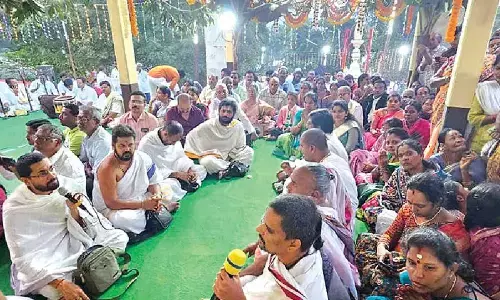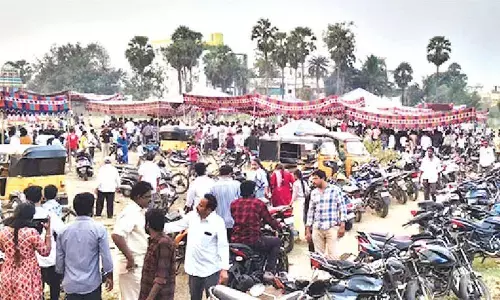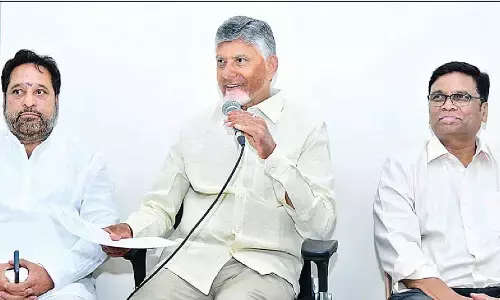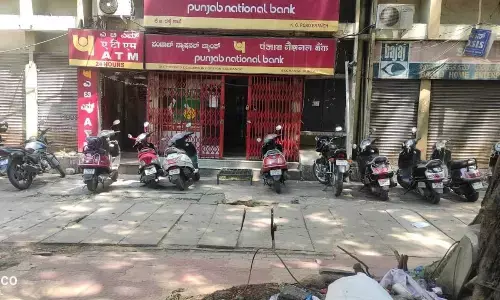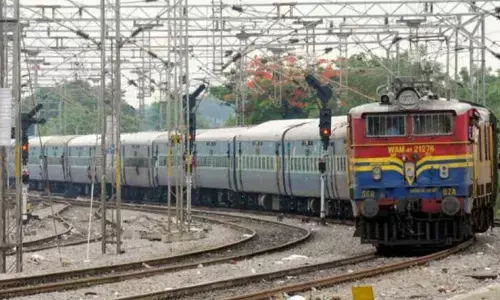Will Agnipath scheme be a game changer?
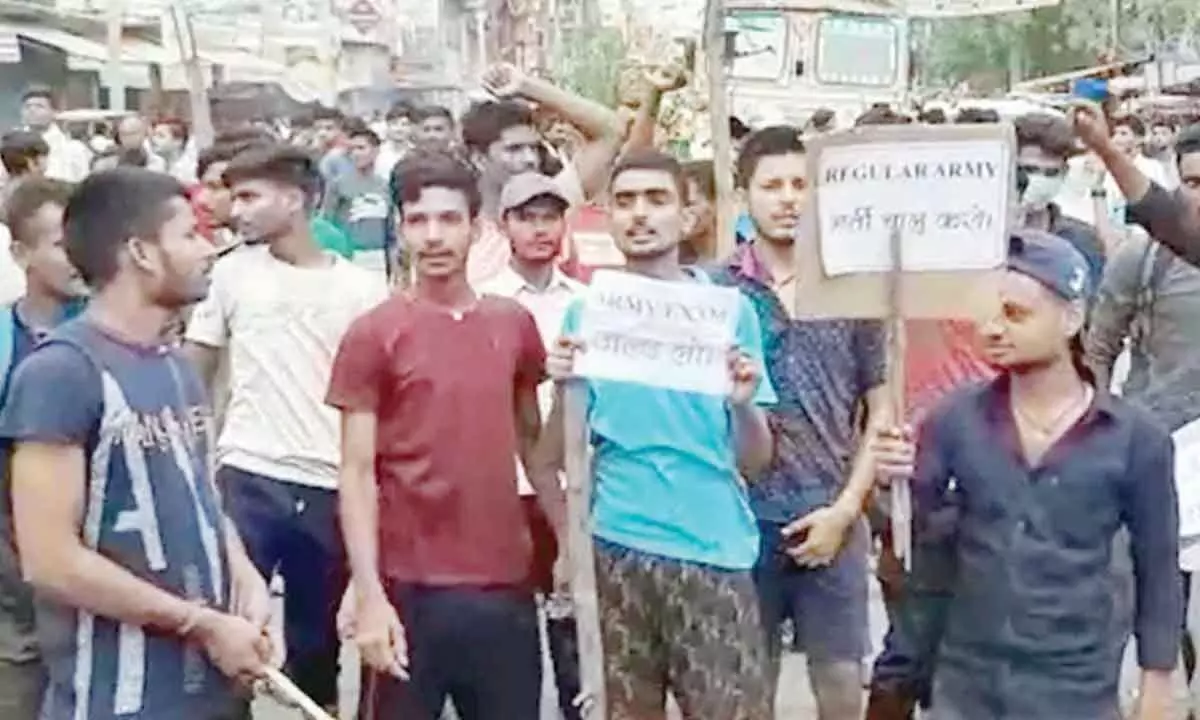
From Bihar, Rajasthan and Uttar Pradesh, to Haryana, Himachal Pradesh, Madhya Pradesh, and from Telangana and Uttarakhand to Assam, and West Bengal, opposition to ‘Agnipath’ continues.
From Bihar, Rajasthan and Uttar Pradesh, to Haryana, Himachal Pradesh, Madhya Pradesh, and from Telangana and Uttarakhand to Assam, and West Bengal, opposition to 'Agnipath' continues.
The protest is not the first by job aspirants, those by railway job aspirants, and those demanding resumption of recruitment of government schoolteachers, being the other recent ones. What is surprising is not the protests but the scale, the nature, and the violence and vandalism, reported in several places. It is, therefore, difficult to dismiss lightly, the feeling in some quarters that, at least in some places, politics has entered the picture.
Experts point out that it is the prospect of first serving in the military and then facing the prospect of uncertain employment, has led to the resentment now in evidence. They also fear that, upon discharge, a large number of youth, trained in the use of weapons, will remain unemployed, and may pose a threat to the law and order situation in the country. A criticism is also heard that the scheme will make the military an 'adventure camp' for people seeking excitement and employment, even if temporary.
A former armoured corps officer has stated that the army's class fighting units have reached their present standard of battle worthiness after nearly two centuries of experience, with their attitude informed by the theme 'Naam, Namak aur Nishan' (honour, loyalty and identity). That passion may not be there in Agniveers.
While the complaint from retired army officers that the scheme plans for 'tourist soldiers', and will adversely impact the armed forces organisational ethics and operational effectiveness, may be an overreaction, the suggestion that the scheme should be tried out as a pilot to test its professed claims and then scaled up, if successful, appears to be worth considering.
Some experts argue that it takes a soldier a long time to emotionally and physically get moulded into his unit groove, become infused with his unit's ethos and, thus, be prepared to lay down his life for the unit's honour. Four years is too short. The government argues that the saving on a soldier, if he serves for four years, instead of the present full service, will amount to around Rs 11.5 crore.
So far as economising on public expenditure is concerned, economy can be achieved in many other ways. Avoiding the liability incurred on account of loan write-offs in the agriculture and industries sectors, for example a potential candidate. A good deal of the wasteful non-plan expenditure can also be saved by appropriate economy measures. Denying a full tenure of service and pension to the new recruits appears an unfair method.
The government cannot have been unaware of the fact that attempts, in the mid-1980s, to create All India All Class (AIAC) units earlier were hastily abandoned, having found it unworkable.
Some consultation with all stakeholders, including the opposition parties, aspirants and potential employers (of the Agniveers, post completion of their tenure), may have been useful. At this stage, patient counselling is indicated. The scheme is sound in what it seeks to achieve, but there are areas where sober reflection and careful consideration of the demands of the protesters will be in order.
Starting a dialogue with potential employers, within the government, and in the corporate sector, to ensure that all those being discharged will be absorbed, and tweaking the training content, during the four years, to correspond to the requirements of the employer – to – be, will also be useful.
That will, at once, solve, not only the problem of the possible unemployment for the Agniveers, after discharge, but also serve save the pension that would have been payable, if they had been given a full tenure of service. A double whammy, in other words!
In this context the Ministry of Education, GoI, is to launch a special, three-year skill-based bachelor degree programme, for serving defence personnel, including Agniveer, that will recognise the skill training received by them during their tenure in the defence forces.
The degree programme will be offered by Indira Gandhi National Open University (IGNOU), and recognised, both in India and abroad, for employment and education. This will enhance the career prospects of 'Agniveers' and equip them for various job roles in the civilian sector.
It is also gratifying to note that, in response to a demand by the agitators for a 20-30 per cent reservation in jobs, the Ministry of Home Affairs (MHA) has announced that 10 per cent of all vacancies in the Central Para Military Forces (CPMF)s and Assam Rifles will be reserved for Agniveers. Besides, a proposal to reserve 10 percent of the job vacancies in the defence ministry has also been approved.
Experts are however, wary about difficulties that will arise in the implementation of these announcements, such as the proposed reservation resulting in exceeding the ceiling imposed by the Supreme Court.
A firm but light touch, as the golf player will tell you that the club should be held, is needed to deal with the protesting youth. Given the commitment of the government to the scheme, finding a mutually acceptable meeting point, for the seemingly divergent points of view, should not pose too difficult a challenge for the versatile, experienced, mature and talented team led by the redoubtable Prime Minister Modi. The battle scarred team has, after all, earlier weathered many such storms successfully.
Compassion for the disturbed youth, and an empathetic attitude towards their aspirations will, one feel confident doubt, inform the government's approach. Today's youth, after all, is the future of the country. And no one knows that better than Prime Minister Modi.
Talking of pensions, I am reminded of my paternal uncle, who had retired after serving as a teacher. While he had put in 28 years in service, he drew his pension for over 40 years! And since his service was during the British rule, he would declare that it served the British right for having to cough up his pension for much longer than the service he had put in!
(The writer is former Chief Secretary, Government of Andhra Pradesh) (The opinions expressed in this column are that of the writer. The facts and opinions expressed here do not reflect the views of The Hans India)








